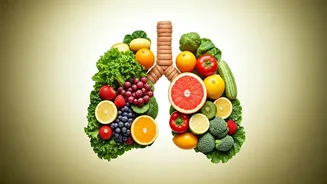Food and Lungs
The relationship between diet and respiratory health is a critical aspect of overall well-being. What we consume daily can significantly impact our lungs,
either supporting their function or contributing to potential harm. Certain foods, even those considered staples, can trigger inflammation, exacerbate existing conditions like asthma, or weaken the lungs' defenses. Understanding which foods to limit or avoid is essential for anyone seeking to optimize their respiratory health. By making informed food choices, individuals can take proactive steps toward healthier lungs and improved breathing.
Processed Foods
Processed foods, commonly found in many diets, often contain high levels of sodium, unhealthy fats, and additives that can negatively affect lung health. Excessive sodium intake can lead to fluid retention, potentially increasing the burden on the lungs and exacerbating breathing difficulties. Trans fats and saturated fats, prevalent in processed snacks and fast food, are known to contribute to inflammation throughout the body, including the lungs. Furthermore, artificial additives and preservatives can trigger allergic reactions or irritate the airways, leading to coughing, wheezing, and other respiratory symptoms. Reducing processed food consumption is a crucial first step toward better lung health.
Sugary Drinks
Sugary drinks, including soda, sweetened juices, and energy drinks, pose a significant threat to respiratory health. High sugar intake can contribute to weight gain and obesity, increasing the risk of respiratory issues. Obesity can restrict lung capacity, making it harder to breathe. Moreover, sugary drinks often lack essential nutrients and can displace healthier choices in the diet. The constant consumption of these beverages has been linked to increased inflammation, which can worsen conditions like asthma and chronic bronchitis. Opting for water, unsweetened tea, or naturally flavored beverages is a better choice to support lung function.
Salty Foods
Excessive salt intake, which is common in many diets, can significantly impact lung health. High sodium levels can lead to fluid retention, which puts extra strain on the lungs and can worsen breathing difficulties. Furthermore, salty foods can trigger inflammatory responses in the airways, causing constriction and increased mucus production. Common culprits include processed meats, canned soups, and salty snacks. Individuals aiming to protect their lungs should carefully monitor their sodium intake and choose low-sodium alternatives whenever possible. Reading food labels and preparing meals at home are effective ways to control salt consumption.
Dairy Products
For some individuals, dairy products can potentially worsen respiratory symptoms. Dairy products can sometimes increase mucus production, which can make it more difficult to breathe and exacerbate conditions such as asthma. Some people are sensitive to lactose or dairy proteins, which can trigger inflammatory responses in the airways. While dairy doesn't affect everyone in the same way, those who experience respiratory problems may find that reducing or eliminating dairy from their diet helps alleviate symptoms. Considering alternatives like almond milk or soy milk can be beneficial for such individuals.
Refined Grains
Refined grains, such as white bread, pasta, and pastries, often lack essential nutrients and can contribute to inflammation in the body. Unlike whole grains, these refined products have been stripped of their bran and germ, which contain fiber and nutrients that support overall health. Inflammation can negatively impact lung health, worsening conditions such as asthma. Moreover, refined grains can cause blood sugar spikes, which may indirectly impact respiratory function. Choosing whole-grain alternatives, such as whole-wheat bread and brown rice, can offer better nutritional value and support respiratory health.
Fried Foods
Foods cooked in oil often become high in unhealthy fats and can trigger inflammation, making breathing harder. Fried foods, common in many cuisines, are often cooked in oils that produce harmful compounds when heated to high temperatures. These compounds can irritate the lungs and contribute to inflammation, potentially worsening existing respiratory conditions. Regular consumption of fried foods has been associated with an increased risk of respiratory illnesses. Individuals aiming to protect their lungs should limit their intake of fried foods and opt for healthier cooking methods like baking, grilling, or steaming.















